-
 Bitcoin
Bitcoin $82,099.5826
-1.34% -
 Ethereum
Ethereum $1,817.9545
-1.07% -
 Tether USDt
Tether USDt $0.9999
0.02% -
 XRP
XRP $2.0815
-3.96% -
 BNB
BNB $595.8647
-1.53% -
 Solana
Solana $124.0327
-0.92% -
 USDC
USDC $1.0000
0.01% -
 Dogecoin
Dogecoin $0.1634
-3.94% -
 Cardano
Cardano $0.6445
-4.65% -
 TRON
TRON $0.2336
1.34% -
 Toncoin
Toncoin $3.9381
2.61% -
 Chainlink
Chainlink $13.2201
-3.75% -
 UNUS SED LEO
UNUS SED LEO $9.0947
-5.84% -
 Stellar
Stellar $0.2646
-1.90% -
 Avalanche
Avalanche $18.6234
-3.91% -
 Shiba Inu
Shiba Inu $0.0...01214
-3.88% -
 Sui
Sui $2.2126
-6.78% -
 Hedera
Hedera $0.1604
-6.61% -
 Polkadot
Polkadot $4.0237
-1.97% -
 Litecoin
Litecoin $82.1655
-4.48% -
 MANTRA
MANTRA $6.2849
-1.13% -
 Bitcoin Cash
Bitcoin Cash $298.8203
-2.66% -
 Dai
Dai $1.0000
0.02% -
 Bitget Token
Bitget Token $4.4293
-4.57% -
 Ethena USDe
Ethena USDe $1.0000
0.01% -
 Pi
Pi $0.6976
-9.77% -
 Hyperliquid
Hyperliquid $12.5853
-0.74% -
 Monero
Monero $215.4717
-0.22% -
 Uniswap
Uniswap $5.8825
-1.85% -
 Aptos
Aptos $5.1958
-2.29%
How do I sign a Bitcoin transaction on Trezor Model T?
To sign a Bitcoin transaction on Trezor Model T, connect the device, initiate the transaction in compatible wallet software, review details on Trezor, and approve to sign securely.
Mar 27, 2025 at 05:49 pm
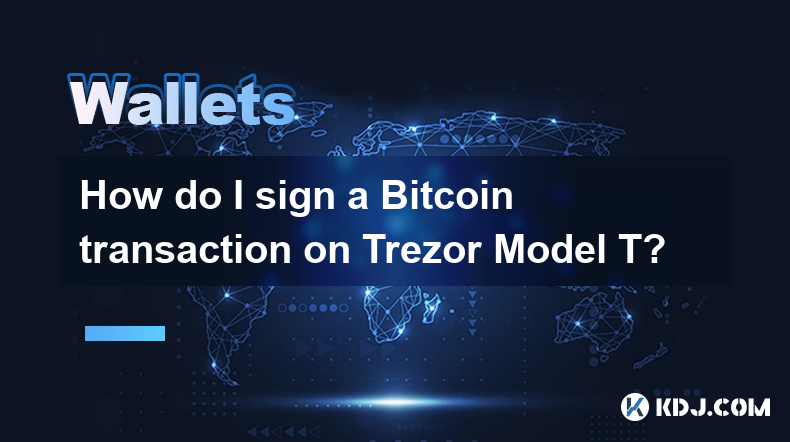
Understanding Bitcoin Transactions and Trezor Model T
Before delving into the signing process, it's crucial to understand what a Bitcoin transaction entails. A Bitcoin transaction is essentially a digital record transferring Bitcoin ownership from one address to another. This record is broadcast to the Bitcoin network and verified by miners. Your Trezor Model T acts as a secure hardware wallet, safeguarding your private keys – the crucial element needed to authorize these transactions. It ensures that your private keys never leave the device, protecting them from malware and online attacks.
Preparing for the Transaction
Before you can sign a transaction on your Trezor Model T, you'll need a few things. First, you'll need a Bitcoin address to send your funds to. This is the recipient's address. Secondly, you'll need to determine the amount of Bitcoin you want to send. Be sure to include any transaction fees, which are crucial for getting your transaction confirmed on the Bitcoin network. Finally, you'll need a Bitcoin wallet software compatible with your Trezor Model T. Many wallets such as Electrum, and others support this.
Step-by-Step Guide to Signing a Bitcoin Transaction on Trezor Model T
The process involves interaction between your Trezor Model T and your chosen wallet software. The steps below assume you’ve already set up your Trezor Model T and have a compatible wallet installed.
Connect your Trezor Model T: Connect your Trezor Model T to your computer using the provided USB cable. Ensure it's properly recognized by your operating system.
Open your wallet software: Launch the wallet software you intend to use to manage your Bitcoin. The specific interface will vary depending on the software you've chosen.
Initiate the transaction: In your wallet software, initiate a new Bitcoin transaction. Enter the recipient's Bitcoin address and the amount you want to send, including the transaction fee.
Confirm on Trezor Model T: Your wallet software will communicate with your Trezor Model T. Your device will display the transaction details, including the recipient's address, the amount being sent, and the transaction fee. Carefully review this information to ensure accuracy.
Sign the transaction: Once you've verified the details on your Trezor Model T, use the navigation buttons on your device to approve the transaction. This action digitally signs the transaction using your private keys, stored securely within the device.
Broadcast the transaction: After signing, your Trezor Model T will confirm the successful signing. Your wallet software will then broadcast the signed transaction to the Bitcoin network.
Understanding Transaction Fees
Transaction fees are essential for getting your transaction confirmed quickly on the Bitcoin network. Miners prioritize transactions with higher fees, ensuring faster processing times. The fee amount is typically determined by the current network congestion and the size of your transaction. Your wallet software usually provides an estimate of the required fee. Choosing a lower fee might result in longer confirmation times, while a higher fee generally leads to quicker confirmation. Always check the recommended fee before finalizing your transaction.
Troubleshooting Common Issues
Occasionally, you might encounter issues during the signing process. If your Trezor Model T fails to connect to your wallet software, ensure the device is properly connected and that the correct drivers are installed. If the transaction details displayed on your Trezor Model T are incorrect, double-check the information entered in your wallet software. If you encounter an error message, consult your wallet software's documentation or the Trezor support website for assistance. Always be cautious and verify all information before confirming any transaction.
Security Best Practices
Remember, your Trezor Model T's security relies on your adherence to best practices. Never share your seed phrase with anyone, and always keep your device physically secure. Regularly update your Trezor Model T's firmware to benefit from the latest security patches. Be wary of phishing attempts that might try to trick you into revealing your seed phrase or signing fraudulent transactions. Prioritize the security of your device and your private keys to ensure the safety of your Bitcoin.
Frequently Asked Questions
Q: What if I make a mistake during the transaction process?
A: If you notice a mistake before signing the transaction on your Trezor Model T, you can cancel the transaction in your wallet software. However, once you sign the transaction on your Trezor Model T, it's generally irreversible.
Q: How long does it take for a Bitcoin transaction to be confirmed?
A: The confirmation time depends on the network congestion and the transaction fee you pay. It can range from a few minutes to several hours.
Q: Can I use any Bitcoin wallet with my Trezor Model T?
A: No, not all Bitcoin wallets are compatible with Trezor Model T. Check the Trezor website for a list of compatible wallets.
Q: What happens if my Trezor Model T is lost or damaged?
A: If your Trezor Model T is lost or damaged, you can recover your Bitcoin using your seed phrase, provided you have safely stored it. However, losing your seed phrase means losing access to your Bitcoin.
Q: Is it safe to use a public Wi-Fi network when using my Trezor Model T?
A: It is generally not recommended to use public Wi-Fi networks when dealing with cryptocurrency transactions. Public Wi-Fi networks are more vulnerable to attacks. Use a secure, private network whenever possible.
Disclaimer:info@kdj.com
The information provided is not trading advice. kdj.com does not assume any responsibility for any investments made based on the information provided in this article. Cryptocurrencies are highly volatile and it is highly recommended that you invest with caution after thorough research!
If you believe that the content used on this website infringes your copyright, please contact us immediately (info@kdj.com) and we will delete it promptly.
- As Sui (SUI) Prepares to Unlock $151M, Coldware (COLD) Quietly Captures the Next Billion Users
- 2025-03-31 21:10:12
- Cryptocurrency investors are increasingly moving capital into stablecoins and tokenized real-world assets (RWAs)
- 2025-03-31 21:10:12
- Rexas Finance (RXS) Attracts Big-Money Investors From Dogecoin (DOGE) and Shiba Inu (SHIB)
- 2025-03-31 21:05:14
- The Resilience of Hyperliquid NFTs
- 2025-03-31 21:05:14
- Hut 8 Launches American Bitcoin, a New Bitcoin Mining Entity Co-founded by Eric Trump
- 2025-03-31 21:05:12
- Avalanche (AVAX) and Near Protocol (NEAR) Stumble as Panshibi (SHIBI) Emerges as the New Meme Coin Giant
- 2025-03-31 21:05:12
Related knowledge

How to easily generate a Bitcoin payment address
Mar 29,2025 at 10:49am
Generating a Bitcoin payment address might seem daunting, but it's actually quite straightforward. This process is crucial for receiving Bitcoin, as each transaction requires a unique address. Understanding how this works is fundamental to using Bitcoin effectively. This guide will walk you through the simple steps, regardless of your technical experti...
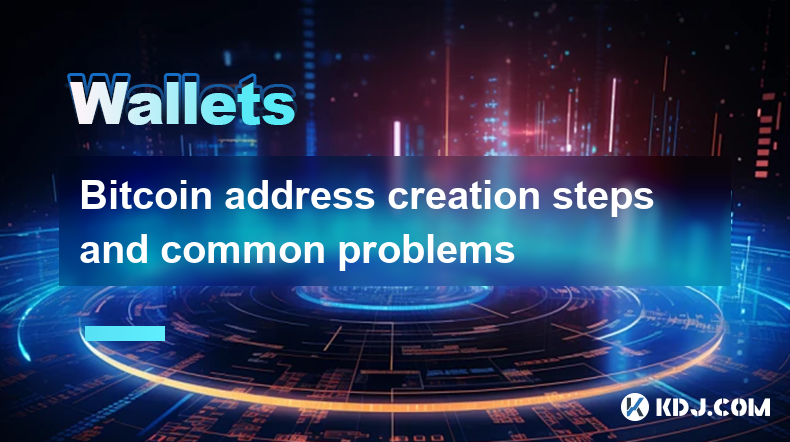
Bitcoin address creation steps and common problems
Mar 30,2025 at 06:07am
Understanding Bitcoin AddressesA Bitcoin address is a unique identifier, similar to a bank account number, used to receive Bitcoin. It's a string of alphanumeric characters generated from a public key, derived from your private key. Understanding the distinction between public and private keys is crucial for Bitcoin security. Your private key should be...
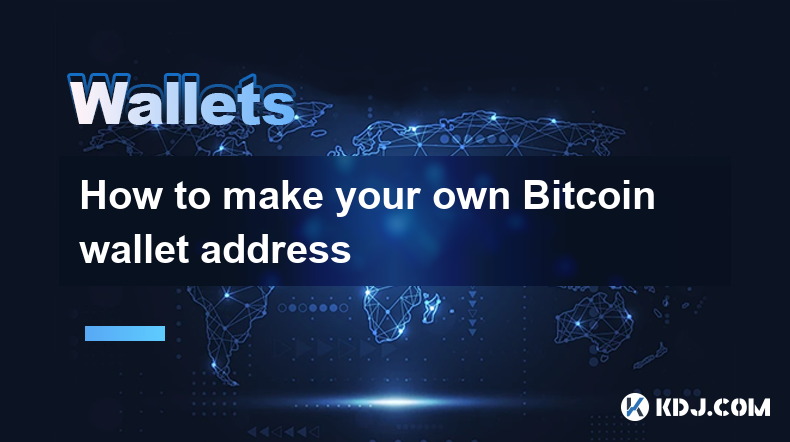
How to make your own Bitcoin wallet address
Mar 29,2025 at 08:42pm
Creating your own Bitcoin wallet address is crucial for securing and managing your Bitcoin holdings. It allows you to independently receive and send Bitcoin without relying on third-party services. This process involves understanding the different types of wallets and choosing the one that best suits your needs and technical expertise. Incorrectly gene...
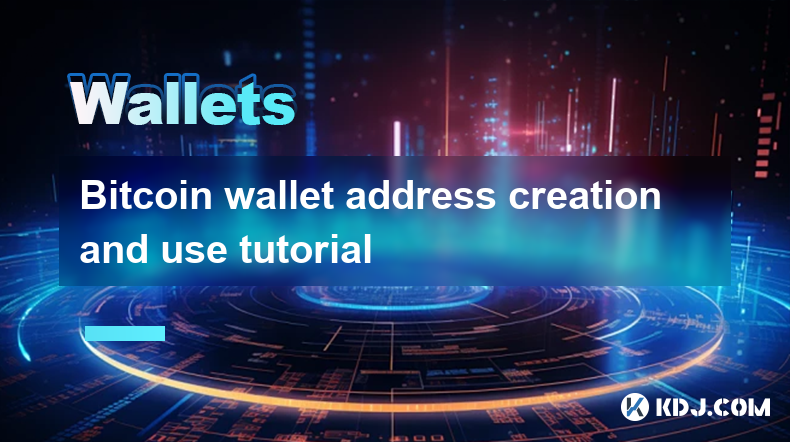
Bitcoin wallet address creation and use tutorial
Mar 29,2025 at 10:14pm
Understanding Bitcoin Wallet AddressesA Bitcoin wallet doesn't store Bitcoin in the way a traditional bank account does. Instead, it stores private keys, which are cryptographic secrets allowing you to access and spend your Bitcoin. Your Bitcoin address, on the other hand, is a public identifier, like an email address, that others can use to send you B...

Bitcoin address generation and secure storage guide
Mar 30,2025 at 08:07am
Understanding Bitcoin AddressesA Bitcoin address is essentially your public key, a string of alphanumeric characters used to receive Bitcoin. It's analogous to your bank account number. Unlike your private key, which is crucial for spending your Bitcoin, your address can be shared publicly without compromising your funds. Generating a new address is sim...
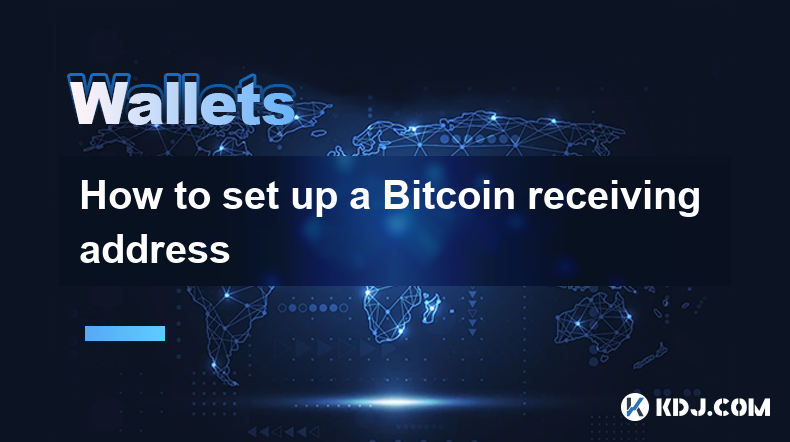
How to set up a Bitcoin receiving address
Mar 30,2025 at 06:14pm
Understanding Bitcoin Receiving AddressesA Bitcoin receiving address is essentially your unique identifier on the Bitcoin network. It's a string of alphanumeric characters that allows others to send Bitcoin to you. Think of it like your bank account number, but specifically for Bitcoin. You need a receiving address to receive Bitcoin. Crucially, you ca...

How to easily generate a Bitcoin payment address
Mar 29,2025 at 10:49am
Generating a Bitcoin payment address might seem daunting, but it's actually quite straightforward. This process is crucial for receiving Bitcoin, as each transaction requires a unique address. Understanding how this works is fundamental to using Bitcoin effectively. This guide will walk you through the simple steps, regardless of your technical experti...

Bitcoin address creation steps and common problems
Mar 30,2025 at 06:07am
Understanding Bitcoin AddressesA Bitcoin address is a unique identifier, similar to a bank account number, used to receive Bitcoin. It's a string of alphanumeric characters generated from a public key, derived from your private key. Understanding the distinction between public and private keys is crucial for Bitcoin security. Your private key should be...

How to make your own Bitcoin wallet address
Mar 29,2025 at 08:42pm
Creating your own Bitcoin wallet address is crucial for securing and managing your Bitcoin holdings. It allows you to independently receive and send Bitcoin without relying on third-party services. This process involves understanding the different types of wallets and choosing the one that best suits your needs and technical expertise. Incorrectly gene...

Bitcoin wallet address creation and use tutorial
Mar 29,2025 at 10:14pm
Understanding Bitcoin Wallet AddressesA Bitcoin wallet doesn't store Bitcoin in the way a traditional bank account does. Instead, it stores private keys, which are cryptographic secrets allowing you to access and spend your Bitcoin. Your Bitcoin address, on the other hand, is a public identifier, like an email address, that others can use to send you B...

Bitcoin address generation and secure storage guide
Mar 30,2025 at 08:07am
Understanding Bitcoin AddressesA Bitcoin address is essentially your public key, a string of alphanumeric characters used to receive Bitcoin. It's analogous to your bank account number. Unlike your private key, which is crucial for spending your Bitcoin, your address can be shared publicly without compromising your funds. Generating a new address is sim...

How to set up a Bitcoin receiving address
Mar 30,2025 at 06:14pm
Understanding Bitcoin Receiving AddressesA Bitcoin receiving address is essentially your unique identifier on the Bitcoin network. It's a string of alphanumeric characters that allows others to send Bitcoin to you. Think of it like your bank account number, but specifically for Bitcoin. You need a receiving address to receive Bitcoin. Crucially, you ca...
See all articles






















































































